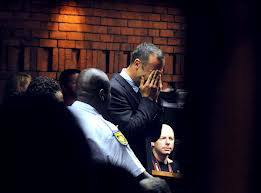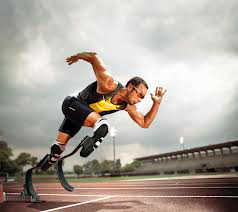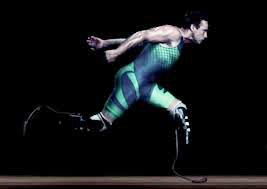Unless you live under a rock or have zero interest in the Olympics you will definitely have been talking about Oscar Pistorius and like most people, be asking the question – ‘what happened?’
How does a young South African, who became the first paralympian to compete in an able-bodied race in the 2012 Olympics, go from being a national hero to standing in a dock with his head hung low accused of murdering his beautiful girlfriend? Is this another case of just a jealous guy with a dark side who can’t control his temper or really a tragic accident? 
We have now seen so many sporting stars who we think are special because of what they have achieved in the sporting arena, only to discover the real truth behind the likes of Tiger Woods, Lance Armstrong and now The Blade Runner.
Do we ever really know anyone? When someone is beautiful or has acting or sporting talent, why do we put them on some sort of pedestal to be admired with the belief that they are not capable of any wrongdoing?
Is Oscar really just a very angry man who had a tough upbringing and had to always compensate for the loss of his lower limbs or could this event have happened to anyone?
If he is found guilty of murder then how do we feel about him? Does it take away all that we thought was impressive and brave or do we see him as two separate halves – the man who ran before us or the murderer? The fact that even the Hollywood Oscars are being overshadowed by this case shows just how affected the world is by seeing someone go from hero to villain.
It doesn’t sit well when you find out something that you thought was – isn’t. How can we ever be sure who someone really is and should we try to know them or should we keep a distance and focus on what they do – not who they are?


Martin Luther King once said;
-“Everything that we see is a shadow cast by that which we do not see.”
I believe that within each and everyone of us lies the potential seeds of growth, happiness, depression, failure, success, anger, kindness, judgement, compassion etc. What the world sees of our behaviour is a result of a choice we have made due to a situation we were faced with.
We are all on a journey, individually and together. This journey constantly puts us in situations we might not have chosen, but where we are presented with choices we have to make. Sometimes we make good ones and sometimes not so good.
Eventhou we are all a product of our surroundings, history and even the history of our ancestors, friends and lovers we can only learn from our own mistakes.
We can all be great when things are going well, but the choices we make in adversity paints a telling picture of who we really are.
What we DO, IS who we are.
It defines our character and it is what the world can see.
Today when we are so focused on external success and we want to go faster, build taller, jump higher and have more, what happens when we reach those targets?
Achieving our goals and achieving success is great – but where do we go from there? Once you’ve got that gold medal or beaten that record what do you do then? Who are you now? What choices are you now presented with?
Life never stops, we are never fully formed, it’s a constant process and within every solution lies a new problem to deal with, a new choice to make.
So maybe if we try to put a little less focus onto what others achieve it would give us more time for our own internal development, a chance to learn from our own mistakes. Perhaps all we have the power to do, and should try to do, is to make the right choice and to improve on who we were yesterday.
Maybe then we can be ready to reach out a helping hand when we meet someone who find themselves in a place of need or confusion, maybe due to a wrong choice or being faced with a situation they do not know how to cope with.
I don’t think we can ever really know who anyone is or where our choices will take us. All we can do is our best and help each other when we stumble, because that is something we all do, from time to time, in one way or another.
This story has been occupying my thoughts a lot since it broke, not only because of my personal connection to South Africa but also because I find the consumption of every scrap of media-provided information by the apparently insatiable public distasteful – in this instance and many others and this will always be the case, sadly.
Until the case has been heard in its entirety and the judicial process runs its course we will no doubt be subjected to ever more gossip, speculation and “facts” about the case that, even if we don’t actively read the stories, will filter into our consciousness, as it has with Lance Armstrong and many others in the public arena. How this can possibly serve the purpose of anyone directly involved with the case is beyond me, nor can I believe that a jury can ever be unprejudiced if there is this level of media coverage.
I agree wholeheartedly with Mariana above. Life is a constant process, we never fully know another person (not even those closest to us), and what we choose to do can represent an aspect of who we are (not wholly and fully who we are, but often the best of ourselves).
When it comes to cases such as this, or Lance Armstrong’s or that of anyone else in the public eye, there is an age old idiom we might be best served to remember – “do not judge another until you’ve walked a mile in their shoes”.
The salacious greed with which stories about the misdemeanours and crimes of those in the public eye are devoured seems to suggest that people no longer consider others from such a compassionate perspective. I’m not for a moment naively believing it ever was thus (history tells us otherwise), but I think that as we all increasingly live a life that is more about interacting with each other at a remove (as I am right now by commenting on a blog) rather than talking with another human being it is easier to forget the adage “If you’ve nothing nice to say, say nothing at all”.
It is so much easier to assume the worst of people and it’s this negative but all-too-human trait which the media manipulates when reporting stories about people like Oscar Pistorius, Tiger Woods, et al.
There are people who murder and abuse who are innately violent, malicious, cruel and evil, without doubt, but equally there are those who commit a “crime of passion” – a term that indicates that the basest parts of a person’s make-up overwhelmed them for moments resulting in an action that they regretted almost immediately and would always regret.
We are all of us, no matter how much we may not like to admit it, capable of both the best and worst of human behaviour and this case, like Lance Armstrong’s, is a reminder of this fact. If we fall, if we commit a crime or act cruelly in some way, should our achievements then be considered any less than they were before we fell from grace?
I do not believe so, on the whole, but also accept that in some instances that a person’s achievements will be forever tainted, to a lesser or greater degree, by their failures.
In the end I believe that it is kindness and compassion that matter most and if someone has mostly shown these qualities in their dealings with others then this should matter most.